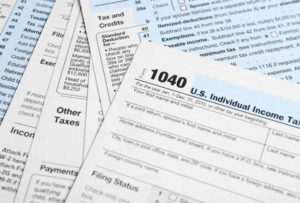The vice president for tax policy at the American Bankers Association (ABA) has detailed the organization”™s opposition to a Biden administration proposal that many say would allow the Internal Revenue Service to “monitor” every deposit and withdrawal from almost every bank account in the U.S.
 Writing in the ABA Banking Journal, John Kinsella pointed out that the administration did not immediately provide the full text of its proposal, which he said “could damage the hard-earned trust customers have in their financial institutions to keep their personal information safe and secure.”
Writing in the ABA Banking Journal, John Kinsella pointed out that the administration did not immediately provide the full text of its proposal, which he said “could damage the hard-earned trust customers have in their financial institutions to keep their personal information safe and secure.”
Kinsella quoted a description of the proposal that was provided by the U.S. Department of the Treasury:
“Financial institutions would report data on financial accounts in an information return. The annual return will report gross inflows and outflows with a breakdown for physical cash, transactions with a foreign account, and transfers to and from another account with the same owner. This requirement would apply to all business and personal accounts from financial institutions including bank, loan, and investment accounts, with the exception of accounts below a de minimis gross flow threshold of $600 or fair market value of $600.”
Kinsella held that the administration”™s thinking was that the IRS would be better able to identify wealthy individuals and companies that are not reporting all of their income if it knew how much money was going into their bank accounts — as well as whether what was coming out indicated spending at a level beyond the income being reported to the IRS.
It”™s estimated by the government that each year the richest 1% of taxpayers are not paying $163 billion in taxes that they should be paying.
Administration officials pointed out that the IRS receives copies of W-2 forms detailing salaries paid to employees while the wealthy may receive funds in ways that are not required to be reported to the IRS other than voluntarily when tax returns are filed.
As opposition to the proposal became more intense, administration officials made statements suggesting that requirements could be met by merely adding information to the Form 1099s already in use. Kinsella said it”™s not as simple as that.
“These statements indicate a lack of appreciation for existing information reporting processes and requirements and the significant extent of new reporting this proposal would require,” he said. “We firmly believe this proposal goes too far and judging by the public reaction to date, many Americans agree.”
The House Ways and Means Committee did not immediately include the “monitoring” proposal in tax legislation that was being drafted because agreement on what it would be and how it would be implemented was lacking. It was widely expected, however, that some additional transaction reporting requirements would make their way into new tax legislation.
“To suggest that the proposal is simple or is targeted at the wealthy is simply false,” Kinsella said. “In fact, recent statements from policymakers suggest that the proposals would indeed affect a wide swath of taxpayers, and are even targeted at small business owners.”
Kinsella pointed out that the ABA and others who advocated against the proposal have been criticized by some of the proposal”™s supporters.
“These statements include implications that we are advocating for ”˜tax cheats,”™ providing misinformation ourselves and exaggerating the difficulties banks will face in implementing this proposed regime. Nothing could be further from the truth,” Kinsella said.
“ABA firmly believes taxpayers should pay what they owe. To suggest otherwise is false,” Kinsella said. “If there are opaque sources of revenue, let”™s focus on addressing that challenge head-on rather than over-collecting information from everyone in the hope that it shines a light on a small number of tax cheats. The IRS currently has significant tools to target those suspected of evading taxes without having to rely on this blunt instrument that will capture the personal financial data of millions of Americans not suspected of tax avoidance.”





















